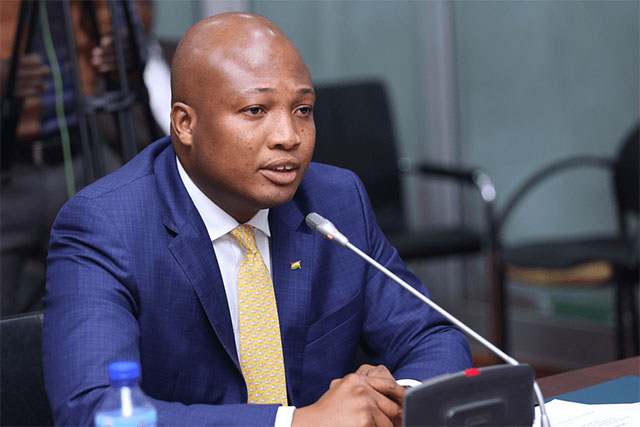BoG tackles Ablakwa over $20m transfer claims, says his actions are ‘unfortunate’

The Bank of Ghana has responded to concerns raised by Samuel Okudzeto Ablakwa regarding a $20 million transfer, which the Member of Parliament claimed lacked consistent documentation.
In a statement issued on Wednesday, August 28, the central bank criticised the legislator for his allegations, noting that the funds were intended for the Central Bank of Liberia, as previously stated.
Without directly naming Mr Ablakwa, the Bank of Ghana expressed disappointment over the MP’s decision to share documents related to the currency transfer publicly.
The central bank highlighted that this action was “unfortunate” and raised significant security concerns, potentially compromising sensitive financial information.
The central bank clarified that the $20 million was transferred to its account as part of an established arrangement with the Central Bank of Liberia.
The funds were to be forwarded to Liberia in accordance with the agreement between the two central banks, which has been in place to facilitate such transactions.
In addressing the controversy, the Bank of Ghana emphasized that all procedures were followed correctly, and the transfer was carried out in line with standard protocols.
The central bank reassured the public that there was no impropriety involved in the transaction, contrary to the allegations made by the MP.
The Bank of Ghana concluded by urging public figures to exercise caution when handling sensitive financial matters, especially those involving international transactions, to avoid unnecessary alarm and potential security risks.
“For the avoidance of doubt, the Bank of Ghana has had a long-standing currency transfer arrangement with the Central Bank of Liberia since 2004, and per this agreement, the Bank of Ghana receives imported currency on behalf of the Central Bank of Liberia for re-export to Monrovia. The said Uncirculated Banknotes mentioned in the social media discussions on August 27 are part of this long-standing arrangement. When all logistical arrangements, including scheduled flights, are finalised, these would be re-exported to the Central Bank of Liberia.
“As part of administrative processes and security protocols, all relevant stakeholders are officially informed of the entry and exit of consignments related to this arrangement. Unless there is mischief intended, there was no reason for this matter to have become an issue for public discussion,” part of the statement stated.
“Currency management is a sensitive operation and has security implications; therefore, it is unfortunate that a lawmaker would circulate such sensitive procedural and administrative clearance letters involving another sovereign nation in a bid to misinform and disinform the public and attach a narrative that seeks to suggest some wrongdoing on the part of the Bank of Ghana.”
The arrangement between the Bank of Ghana and the Central Bank of Liberia signifies mutual trust between the two countries and a testament to the strong bond of friendship between Accra and Monrovia,” the statement added.
Samuel Okudzeto Ablakwa, the Member of Parliament for North Tongu, has expressed concerns over the transfer of $20 million to the Bank of Ghana, questioning the consistency of the documentation involved.
In a post shared on X on Tuesday, August 27, 2024, Ablakwa highlighted that the $20 million was cleared by officials of the Ghana Revenue Authority (GRA) and was intended for the Central Bank of Liberia.
He noted that while documents addressed to the GRA indicate that the money was sent to the Bank of Ghana for safekeeping before being transferred to Liberia, records from Ghana’s central bank suggest a different narrative.
Mr Ablakwa stated that he is closely monitoring the situation to ensure that the funds are indeed transferred to Liberia and not retained by the Bank of Ghana, as it has claimed.





